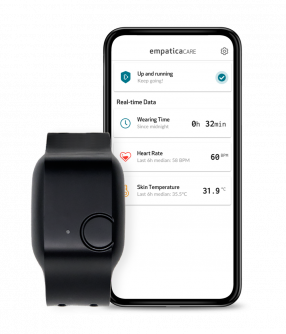Empatica E4 watch
University of Miami Miller School of Medicine researchers are recruiting health care workers to study whether a wearable device, a wristwatch, can capture real time data that can be used to alert wearers of subtle physiological changes that may indicate they have become infected with COVID-19.
The goal of the research is to prevent COVID-19 transmission in health care settings by letting wearers know that they may have been infected before clinical signs or symptoms of the virus start, according to Frank J. Penedo, PhD, associate director for cancer survivorship and translational behavioral sciences at Sylvester Comprehensive Cancer Center and professor of psychology and medicine at the Miller School of Medicine.
“The wearable device employs an algorithm to capture early signs for respiratory infection. We are recruiting 70 health care workers who do not have COVID-19 and have opted not to get the COVID-19 vaccine. We are asking that they wear the Empatica E4 watch for 30 days during non-working hours. Participants will also take a daily nasal swab to detect whether they have seroconverted to COVID-19,” Penedo said. “The idea is to be able to pull biometric data such as temperature and heart rate together to see if there is a way to accurately predict seroconversion to COVID-19 prior to the development of clinical symptoms that otherwise might not be detected.”
Conceptually, the early warning system could prompt wearers to get a COVID-19 test to confirm results from the device, then quarantine with less risk of spreading the virus, he said.
Miller School researchers have been among the pioneers in conducting National Institutes of Health-funded trials looking at wearable devices for various applications. Many of these devices capture biometric data, including heart rate, skin conductance, temperature, heart rate variability, sympathetic nervous system activation and other markers that suggest stress, illness and more in real world settings. Some studies use the devices to monitor sleep quality, workday stress or the body’s reaction to recreational activities.
“When you put it all together you have a pretty comprehensive set of biological data that can give you a picture of how the individual is functioning prior to developing overt symptoms of disease,” Penedo said.
This multisite study, funded by the U.S. Department of Health and Human Services Biomedical Advanced Research and Development Authority, is looking for subtle changes that take place in an individual’s physiological functioning that might not be noticeable but are indicative of being infected with the virus, including even slight changes in temperature.
Source: University of Miami Health System

Be the first to comment on "Researchers Studying Wearable Device to Help Detect COVID-19 Upon Infection"